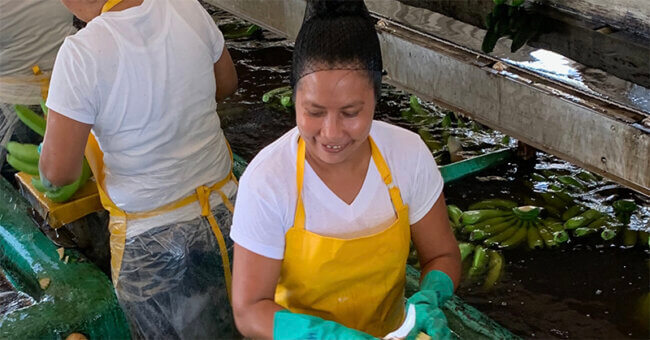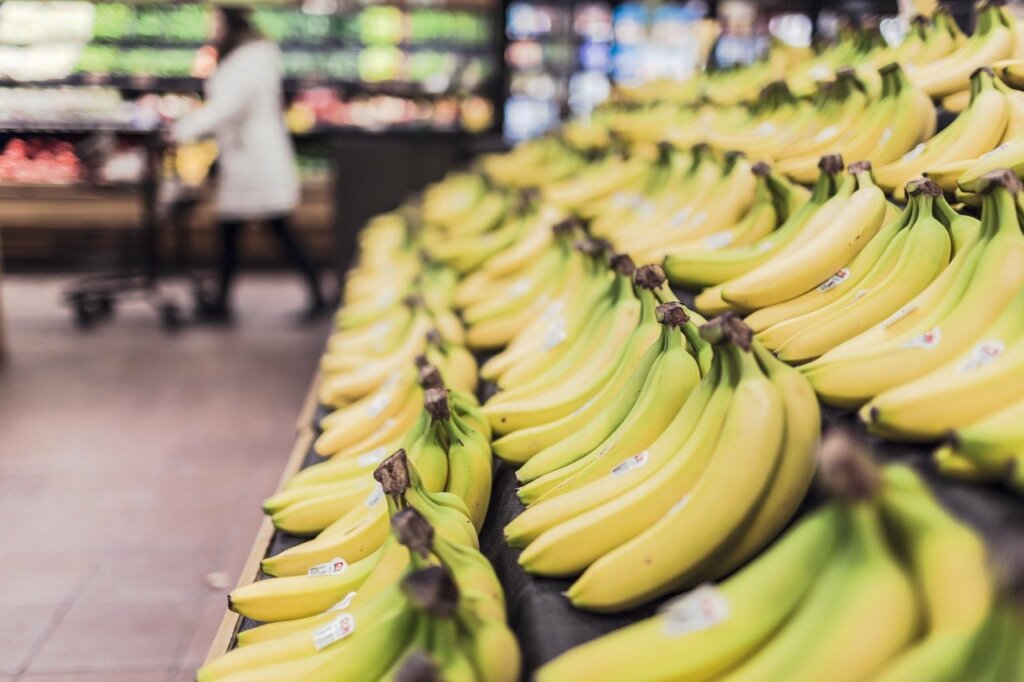Banana Link partnered with ALDI SOUTH Group and ALDI Nord in the first pilot to explore the role that trade unions can take in the verification of living wage data. The pilot was undertaken in 2022, with independent mediation from Heartwood LLC and the participation of Dole, Grupo Iren and Banafem in the first project of its kind to be undertaken in the banana industry.
Three farms that supply ALDI SOUTH Group directly participated in the project. Verification of the data was led by independent trade unions, where they were active, and where they were not, by farm worker groups and Fairtrade worker committees. In a report shared by ALDI South Group last week, the importance of developing trust and dialogue between partners was emphasized in order for open, transparent and accurate wage data verification: ‘… by establishing dialogue, collaboration and building trust among all the relevant stakeholders, farms were more open to share sensitive information. This enabled more accurate wage calculations as well as an effective verification mechanism. This process worked most effectively when an independent trade union was present and involved”, ALDI stated.
Findings showed that this model of worker- led living wage data verification was able to provide important contextual information that added value to the process of wage verification. For example, where trade unions provided the wage data verification, they were able to point out annual fluctuations in pay that is behind the average wage data. Further dialogue between the farm management and the workers union is planned to find solutions to this particular issue. Where no union was present, workers groups undertook to verify the wage data. The results showed that transparent dialogue on related topics was achieved, in a way that remote checks or audits would not normally produce. Worker-led living wage verification is not only able to provide important qualitative information to situate the quantitative, but also- by engaging workers and farm management in a mediated process with a clear outcome- it strengthens the capacity for further dialogue between workers and employers on issues of mutual interest.

Last week, retailers from each of the four European countries which have made a public commitment to implementing living wages in their banana supply chains, along with union representatives and civil society organisations, met to share learning on the process of implementing living wages. It was recognised by many that trade unions are uniquely positioned to support the living wage process. However, while the benefits of worker- led living wage data verification in terms of accuracy is clear, it is just as important to recognise that engaging workers in living wage data verification is also the ethical route. This is a moment of sea-change in the banana industry, and by engaging workers in the living wage process, we empower them as equal partners and agents for change. As one participant at the meeting put it, any discussion around the implementation of living wages should always be a discussion WITH workers, and not ABOUT them.
With that said, it is important to recognise that the collection and sharing of wage data by producers and the verification of the data on the part of unions requires an investment of time and resources. It is widely accepted in the living wage movement that long-term buying relationships with producers are fundamental in order to build trust and allow time for the process of living wage implementation. Producers who fear they will lose contracts if they provide the ‘wrong’ data are unlikely to act transparently, and any resulting loss of jobs and incomes for workers would be contrary to the values of the living wage movement. In addition, in order for unions to be equal partners in the living wage and living income discussion, it is crucial for them to receive targeted, high quality training on the process of wage data verification as well as the broader living wage movement itself. As ALDI noted in their report: “To ensure scalability for such an approach, investments into large-scale capacity building for local trade unions and worker representative groups are needed..”
Banana Link has spent many years campaigning for living wages in the banana industry. Achieving living wages for banana workers is arguably our most fundamental and central purpose. So, while there is still a long way to go, it is gratifying to note the progress made so far and to applaud those retailers who have participated in months of dialogue with their competitors in order to get to this point- the outcome of which will have a massive positive impact on workers in the Global South. We are at a point where it feels like the challenge ahead is not only surmountable, but that the banana industry has a golden opportunity to be leaders of positive change for other sectors, too.
While this is just the first pilot study of worker-led living wage verification, Banana Link hopes the template will be taken up widely in the banana industry and beyond. For other retailers working towards achieving a living wage in their banana supply chains, ALDI makes following recommendations:
- Include requirements around the tracking of wages in procurement policies and contracts with suppliers to increase transparency and simplify the verification
- Engage in pre-competitive collaboration to support large-scale capacity building on living wage application for trade union and worker representative groups
- Engage on-the-ground partners to repeat similar processes with more farms. Start by focusing on similar projects where independent trade unions are operational
- Facilitate and support open dialogue between trade union members and farm management. On non-unionised farms, aim to strengthen dialogue between farm management and worker representatives, with increased protection for the worker representatives
- Work with partners to build further capacity of trade unions on living wage verification
- Include relevant standard organisations in the delivery of capacity building and training
